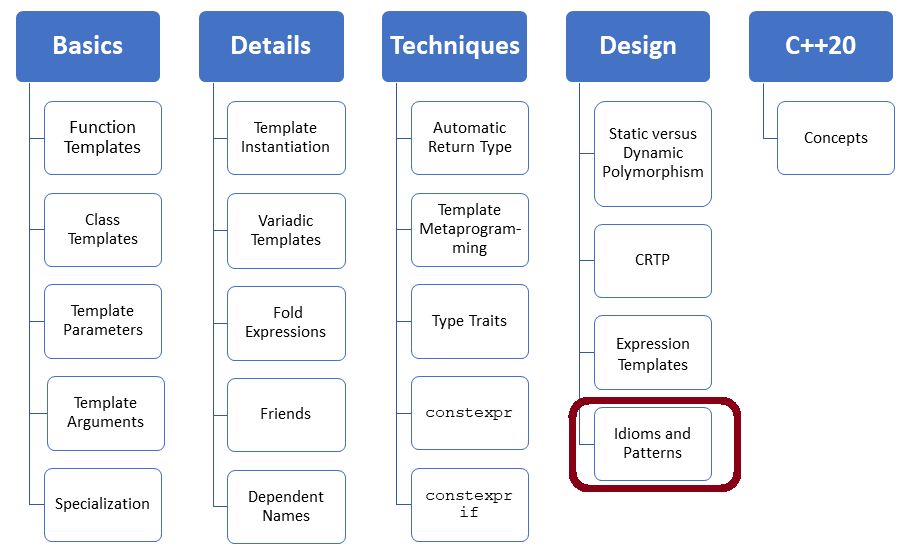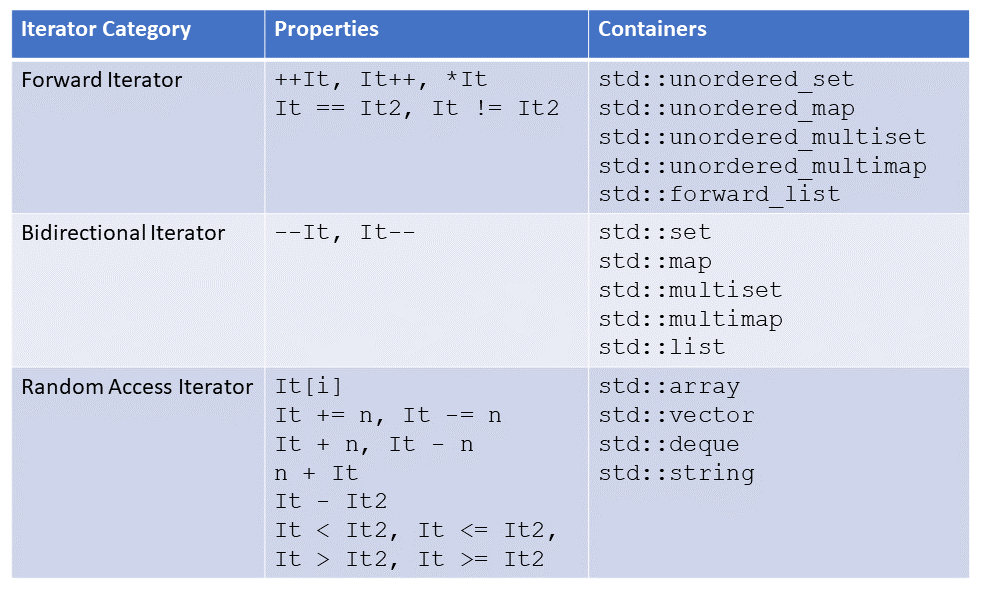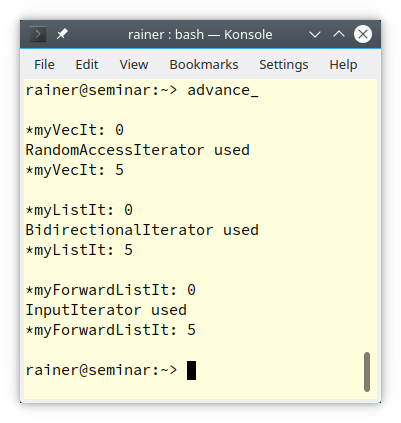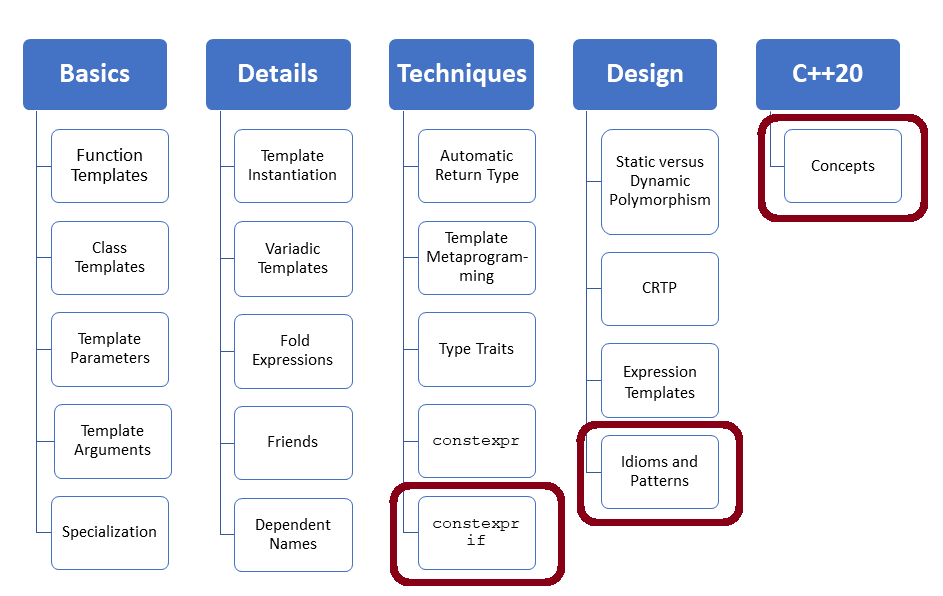Software Design with Traits and Tag Dispatching
Tag Dispatching enables it to choose a function based on the type characteristics. This decision takes place at compile time and is based on traits.

Tag dispatching is based on traits. Consequentially, I want to write a few words about traits.
Traits
Traits are class templates that provide characteristics of a generic type. They can extract one or more characteristics of a class template.
You may already assume it; the metafunctions from the type-traits library are typical examples of traits in C++. I have already written a few posts about them. Here are they:
Before I directly jump in this post in tag dispatching, I want to introduce the iterator traits. The following code snippet shows their partial specialization for pointers:
template<T> struct iterator_traits<T*> { using difference_type = std::ptrdiff_t; using value_type = T; using pointer = T*; using reference = T&; using iterator_category = std::random_access_iterator_tag; };
The iterator categories build the following hierarchy:

 Modernes C++ Mentoring
Modernes C++ Mentoring
Do you want to stay informed: Subscribe.
struct input_iterator_tag{}; struct output_iterator_tag{}; struct forward_iterator_tag: public input_iterator_tag{}; struct bidirectional_iterator_tag: public forward_iterator_tag{}; struct random_access_iterator_tag: public bidirectional_iterator_tag{};
The various iterator categories correspond to the container of the Standard Template Library.

The following relation holds for the iterator categories and their support operations. A random-access iterator is a bidirectional iterator, and a bidirectional iterator is a forward iterator. This means std::array, std::vector, and std::string support a random-access iterator but not std::list.
Tag Dispatching
Now, I can apply tag dispatching and implement a fine-tailored advance_ algorithm optimized for the used container. First of all, std::advance is already part of the standard template library:
template< class InputIt, class Distance > void advance( InputIt& it, Distance n ); (until C++17) template< class InputIt, class Distance > constexpr void advance( InputIt& it, Distance n ); (since C++17)
std::advance increments a given iterator it by n elements. If n is negative, the iterator is decremented. Consequentially, the container providing the iterator must be, in this case, bidirectional.
Here is my implementation of advance_:
// advance_.cpp #include <iterator> #include <forward_list> #include <list> #include <vector> #include <iostream> template <typename InputIterator, typename Distance> void advance_impl(InputIterator& i, Distance n, std::input_iterator_tag) { std::cout << "InputIterator used" << '\n'; if (n >= 0) { while (n--) ++it; } } template <typename BidirectionalIterator, typename Distance> void advance_impl(BidirectionalIterator& i, Distance n, std::bidirectional_iterator_tag) { std::cout << "BidirectionalIterator used" << '\n'; if (n >= 0) while (n--) ++i; else while (n++) --i; } template <typename RandomAccessIterator, typename Distance> void advance_impl(RandomAccessIterator& i, Distance n, std::random_access_iterator_tag) { std::cout << "RandomAccessIterator used" << '\n'; i += n; // (5) } template <typename InputIterator, typename Distance> // (4) void advance_(InputIterator& i, Distance n) { typename std::iterator_traits<InputIterator>::iterator_category category; advance_impl(i, n, category); } int main(){ std::cout << '\n'; std::vector<int> myVec{0, 1, 2, 3, 4, 5, 6, 7, 8, 9}; // (1) auto myVecIt = myVec.begin(); std::cout << "*myVecIt: " << *myVecIt << '\n'; advance_(myVecIt, 5); std::cout << "*myVecIt: " << *myVecIt << '\n'; std::cout << '\n'; std::list<int> myList{0, 1, 2, 3, 4, 5, 6, 7, 8, 9}; // (2) auto myListIt = myList.begin(); std::cout << "*myListIt: " << *myListIt << '\n'; advance_(myListIt, 5); std::cout << "*myListIt: " << *myListIt << '\n'; std::cout << '\n'; std::forward_list<int> myForwardList{0, 1, 2, 3, 4, 5, 6, 7, 8, 9}; // (3) auto myForwardListIt = myForwardList.begin(); std::cout << "*myForwardListIt: " << *myForwardListIt << '\n'; advance_(myForwardListIt, 5); std::cout << "*myForwardListIt: " << *myForwardListIt << '\n'; std::cout << '\n'; }
I use in the example a std::vector (line 1), a std::list (line 2), and a std::forward_list (line 3). A std::vector supports a random-access iterator, a std::list bidirectional iterator, and a std::forward_list forward iterator. The call std::iterator_traits<InputIterator>::iterator_category category; in the function advance_ (line 4) determines the supported iterator category based on the given iterator. The final call advance_impl(i, n, category) finally dispatches to the most specialized overload of the implementation function advance_impl.
To visualize the dispatch, I added a short message to implementation functions advance_impl.

What are the advantages of such a fine-tuned advance implementation?
- Type safety: The compiler decides which version of
advance_implis used. Consequentially, you cannot invoke an implementation requiring a bidirectional iterator with a forward iterator. Backward iterating with a forward iterator is undefined behavior. - Performance: Putting a forward or bidirectional iterator n position further requires n increment operation. Its complexity is, therefore, linear. This observation does not hold for a random access iterator: Pointer arithmetic such as
i += n(line 5) is a constant operation.
What’s next?
In my next post, I bridge dynamic polymorphism (object orientation) with static polymorphism (templates) to introduce a sophisticated technique: type erasure.
The Future of Modernes C++
The type erasure post will be my last post about templates for now. To get the previous ones, use the TOC or the category Templates. Afterward, I will continue to write about C++20 and will peek into the C++23 future. If you have some exciting post ideas, please write me an e-mail: Rainer.Grimm@modernescpp.de.
Thanks a lot to my Patreon Supporters: Matt Braun, Roman Postanciuc, Tobias Zindl, G Prvulovic, Reinhold Dröge, Abernitzke, Frank Grimm, Sakib, Broeserl, António Pina, Sergey Agafyin, Андрей Бурмистров, Jake, GS, Lawton Shoemake, Jozo Leko, John Breland, Venkat Nandam, Jose Francisco, Douglas Tinkham, Kuchlong Kuchlong, Robert Blanch, Truels Wissneth, Mario Luoni, Friedrich Huber, lennonli, Pramod Tikare Muralidhara, Peter Ware, Daniel Hufschläger, Alessandro Pezzato, Bob Perry, Satish Vangipuram, Andi Ireland, Richard Ohnemus, Michael Dunsky, Leo Goodstadt, John Wiederhirn, Yacob Cohen-Arazi, Florian Tischler, Robin Furness, Michael Young, Holger Detering, Bernd Mühlhaus, Stephen Kelley, Kyle Dean, Tusar Palauri, Juan Dent, George Liao, Daniel Ceperley, Jon T Hess, Stephen Totten, Wolfgang Fütterer, Matthias Grün, Phillip Diekmann, Ben Atakora, Ann Shatoff, Rob North, Bhavith C Achar, Marco Parri Empoli, Philipp Lenk, Charles-Jianye Chen, Keith Jeffery, Matt Godbolt, and Honey Sukesan.
Thanks, in particular, to Jon Hess, Lakshman, Christian Wittenhorst, Sherhy Pyton, Dendi Suhubdy, Sudhakar Belagurusamy, Richard Sargeant, Rusty Fleming, John Nebel, Mipko, Alicja Kaminska, Slavko Radman, and David Poole.
| My special thanks to Embarcadero |  |
| My special thanks to PVS-Studio |  |
| My special thanks to Tipi.build |  |
| My special thanks to Take Up Code |  |
| My special thanks to SHAVEDYAKS |  |
Modernes C++ GmbH
Modernes C++ Mentoring (English)
Rainer Grimm
Yalovastraße 20
72108 Rottenburg
Mail: schulung@ModernesCpp.de
Mentoring: www.ModernesCpp.org
Modernes C++ Mentoring,






Leave a Reply
Want to join the discussion?Feel free to contribute!